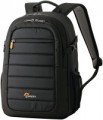Product type
—
Case. Provides minimal protection - mainly from dust, scratches and (sometimes) moisture. Well suited, for example, for carrying in hands or in a larger bag along with other things. The advantage of cases is compactness and light weight.
—
Case. It is made in the form of a pencil case. In the middle there are different sections, both for the photo-video camera itself and for different accessories, such as additional memory cards, a battery, a cloth for wiping the camera or its optics. It is made of fairly rigid materials.
— Bag. Classic bags are very versatile, well suited for any kind of travel, and usually have additional internal and external compartments. The thick and soft materials that most bags are made of provide some degree of shock protection even in officially ''non-shockproof'' models. They are usually equipped with a carrying handle and a shoulder strap.
—
Backpack. A special backpack with a compartment for a camera. As a rule, they are made of waterproof materials. They are very convenient for transportation, as they allow carrying on the shoulders. Quite capacious, in addition to photo and video equipment, they are designed for a variety of additional things.
—
Case. They have the highest level of protection compared to other types of camera bags. As a rule, they are made of metal,
...most often aluminum; when using textile or leather materials, a rigid frame (plastic, metal) is added to the design. The case can easily accommodate photo and video equipment and a set of lenses for it.
— Suitcase. Models of different shapes and types, including tech equipped with wheels. As a rule, they are designed to carry not only a photo-video camera and accessories, but also a fairly large number of additional things. This option is useful for tech who have to travel often.Suitable for
—
For cameras (DSLR). Bags or other protective devices designed for DSLR cameras. Such cameras are much larger in size than most compacts; in addition, when using them, you have to deal with many detachable accessories - lenses, flashes, boosters, etc. Taking this into account, products for this purpose should have good capacity, and ideally - also compartments or external pockets for additional equipment. On the other hand, there is no official division into bags for DSLRs and compacts, so in this case it is rather arbitrary. In our catalog, two types of products are considered models for DSLR cameras: firstly, those in which the size of at least one dimension is 150 mm or more; secondly, those in which special equipment is provided, such as a separate pocket for a lens (regardless of the dimensions of the bag).
—
For cameras (compacts). Bags designed for use with compact cameras. In addition to their small size, such cameras are also characterized by autonomy — in the sense that everything necessary for shooting is usually built into the device itself: non-removable optics, its own flash, etc. Therefore, bags for compact equipment do not need large dimensions and additional pockets/compartments. Therefore, in our catalog, all products whose dimensions do not exceed 150 mm, and the design does not provide for special "SLR" equipment, are classified as models for compacts (for more information on suc
...h equipment, see above).
— For video cameras. A bag for a video camera, designed to protect against mechanical damage and accidental impacts. Can be additionally protected by a frame made of plastic or metal, which gives additional rigidity. Various materials are used for manufacturing. Equipped with additional internal or external pockets.
— For lenses. The bag is designed to protect interchangeable lenses of photo and video devices.
— Tripod case. Cases are available in different sizes (lengths) for tripods with different heads. The case usually opens with a zipper along the entire length, which allows you to quickly put in or take out the tripod. Often, waterproof materials are used for manufacturing.Compartments for photographic equipment
When choosing a camera bag, pay attention to the size of the camera compartment. This compartment is designed for storage and safe transportation of photographic equipment, and has dense and soft protective walls. The larger the size of the camera and the number of lenses / photo accessories used, the larger and more spacious the compartment for storing them should be.
Removable partitions
In semi-professional and professional models, the camera / lens compartment is equipped with
removable soft partitions. This allows you to adjust the interior space of the compartment to your liking.
External compartments
The outer compartment is designed to store small personal items/photo accessories and quickly access them. Usually, it is fastened with a zipper or Hook-and-loop.
Laptop/tablet compartment
Designed for storage and safe
transportation of a laptop/tablet. Has dense and soft protective walls.
Personal items compartment
Designed to store small
personal items and photo accessories.
Bottle pocket
Special
niche for a container with liquid. Can be used as an extra pocket.
Carrying handle

